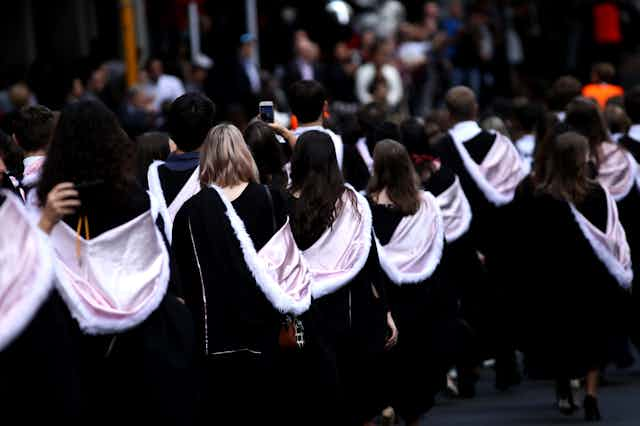The headline job loss figures from New Zealand’s university funding crisis are in the public domain: over 100 gone at Otago University, with as many as 250 potentially about to go from Te Herenga Waka–Victoria and Massey. But these are only the losses we know of.
Behind the institutional veil, academic and administrative staff are quietly upping sticks for other, more secure working environments.
The proffered reasons for the proposed cuts include the loss of international students during the COVID-19 years, a steep reduction in the value of the public subsidy for domestic students over the past decade, and a funding model that encourages competition in a shrinking demographic pool.
More broadly, the sector-wide retrenchment is also framed around accountability to the taxpayer. What has not been interrogated more deeply is what price the notional taxpayer will pay over the long term if cuts of this magnitude occur.
The threat to the country’s research and development strategy from underfunded science departments is perhaps clearer. But the risks from losing more staff in the humanities and social sciences (where I work) are arguably less well appreciated.
Thinking critically
Essentially, studying social sciences and humanities subjects is about making sense of things: oneself, the societies in which we live, the connections between past, present and future.
If that sounds a little “ivory tower”, it is in fact a statutory obligation of tertiary institutions to be a “critic and conscience of society”. That is, to enable people to think for themselves, challenge received wisdoms and ask questions of those in positions of power.
More practically, the attributes and dispositions imparted in the humanities and social sciences – the capacities to think critically, synthesise complex information and hold contradictory ideas in balance – are extremely useful in today’s rapidly changing labour market.
Unfortunately, it has been fashionable (at least in New Zealand, less so in more mature societies) to deride the bachelor of arts degree as one that won’t get you far. The old joke that BA stood for “bugger all” never seems to get old.
Business and the humanities
And yet, the hard-headed world of business and commerce is increasingly aware of the value of just such an education. Maybe most famously in New Zealand, the highly successful international property developer Bob Jones has long expressed a preference for employing arts rather than business graduates.
More recently, the former CEO of Westpac Institutional Bank, Lyn Cobley, spoke about the need for the kinds of diverse skills an arts degree can provide:
We’re not focusing as much on the traditional skillset that we once thought was necessary in banking – financial modelling, accounting, commerce – but rather we’re looking for people who display diversity of thought, critical thinking skills, cultural awareness, communication and collaboration skills.
Paul Newfield, philosophy graduate and now CEO of infrastructure company Morrison & Co, is another who is acutely aware of the importance in business of diverse views and backgrounds:
The magic for us is being a culture where people respect different perspectives, and really engage in debate and in the ideas, and then you get good answers.
In other words, workplace-specific skills can be taught on the job. But that’s a lot easier to do when you’re working with curious people possessed of good, nimble minds – the kind of minds fostered in the arts disciplines.
Read more: Starved of funds and vision, struggling universities put NZ’s entire research strategy at risk
No technical fixes
The sense-making skills cultivated in the humanities and social sciences are valued by employers. But they are even more important in the wider context of a world facing numerous challenges.
Highly complex issues – the climate crisis, the emergence of artificial intelligence, disinformation and political extremism, race and gender prejudice, and social inequality – are not wholly amenable to technical fixes.
Each has fundamentally to do with human behaviour and interactions. And therefore each requires the sorts of practices cultivated in the arts disciplines: careful thought, calm deliberation and meaningful collaboration.
Read more: NZ music schools under threat: we need a better measure of their worth than money
And this isn’t simply special pleading from those within the threatened disciplines and departments.
Robert May, president of the Royal Society, member of the House of Lords and Chief Scientific Adviser to the British government, put it this way:
I think many of the major problems facing society are outside the realm of science and mathematics. It’s the behavioural sciences that are the ones we are going to have to depend on to save us.
The proposed reductions in staffing within those disciplines in New Zealand universities run counter to that sentiment. Public policy, functioning democracy and social cohesion are all at stake in the longer term.
Archaic assumptions about the “value” of the disciplines of the humanities and social sciences need to be put to rest. We need to acknowledge their importance to the economy and society.
Filling a hole in this year’s budget may only mean the price we pay in years to come will be far larger.

